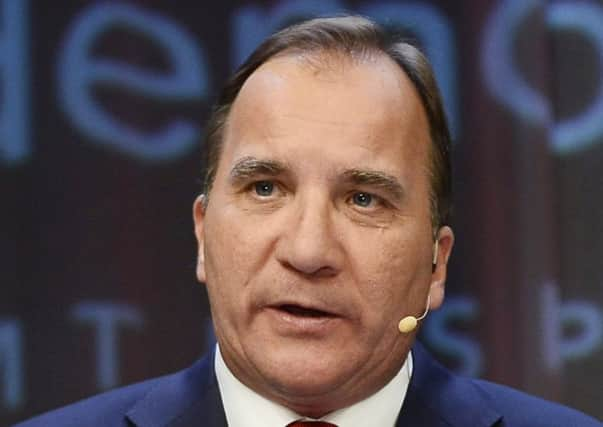Sweden slides back to left but coalition poses problem


Stefan Lofven faces a tough task building a new government after Sunday’s election left the centre-left short of a majority in parliament and handed the balance of power to a party that wants to slash immigration.
Prime minister Fredrik Reinfeldt and his centre-right coalition government, in power for eight years, handed in their resignation yesterday after garnering fewer seats in parliament than the centre-left opposition.
Advertisement
Hide AdAdvertisement
Hide AdThe far right anti-immigration Sweden Democrats emerged as the third-biggest party, winning 12.9 per cent of the vote.
But despite their holding the balance of power, other parties have refused to work with them.
“Sweden is waking up to a new political landscape,” Robert Bergqvist, chief economist at Skandinaviska Enskilda Banken, said in an analysis.
“Political authority and stability will be determined by the potential for informal cross-bloc co-operation and by inter-party agreements and resolve to isolate the Sweden Democrats.”
Mr Lofven said he would begin coalition talks with the Greens but reach out to others.
At the height of the global financial crisis Mr Lofven, a former trade union negotiator, did the unthinkable and cut a deal with employers agreeing pay cuts and shorter hours.
The deal, which some industrialists say helped many Swedish firms survive the crash, underscored his pragmatism and negotiating skills.
“He doesn’t look for battles and conflict, but for solutions,” Anders Weihe, said chief negotiator for industrial employer organisation Teknikforetagen.
Advertisement
Hide AdAdvertisement
Hide Ad“At the same time, he is as stubborn as a mule. When he has decided on something, it’s tough to get him to change his mind.”
The centre-left Social Democrat, Green and Left opposition, – not currently a formal bloc – took 158 seats in parliament, short of the 175 needed for a majority.
A minority left-of-centre government with an anti-immigration party that usually votes with the right-leaning parties holding the balance of power would be a unique parliamentary situation in Sweden. It is likely to have limited clout to pass bills and could even result in political deadlock.
Lofven hopes to entice members of the outgoing four-party centre-right Alliance to co-operate with him. They have so far ruled out such a move but that may change in the face of the strong performance by the Sweden Democrats.
The Swedish crown weakened over the weekend on market concerns over the potential for political instability.
“It has never been this difficult to conduct an election analysis after a parliamentary election,” Jesper Bengtsson of the left-leaning think-tank Tiden said in an analysis.
Independent liberal daily paper Dagens Nyheter said the Sweden Democrats could regularly vote down bills by a Social Democrat-led government.
It also said it would be difficult for centre-right parties to co-operate with the new government after they flatly refused before the election to do so.
Advertisement
Hide AdAdvertisement
Hide AdMr Lofven’s middle-of-the-road social democracy and calls for more welfare spending are a comforting return to tradition for voters, coming after eight years of centre-right prime minister Fredrik Reinfeldt’s cuts in tax and public spending.